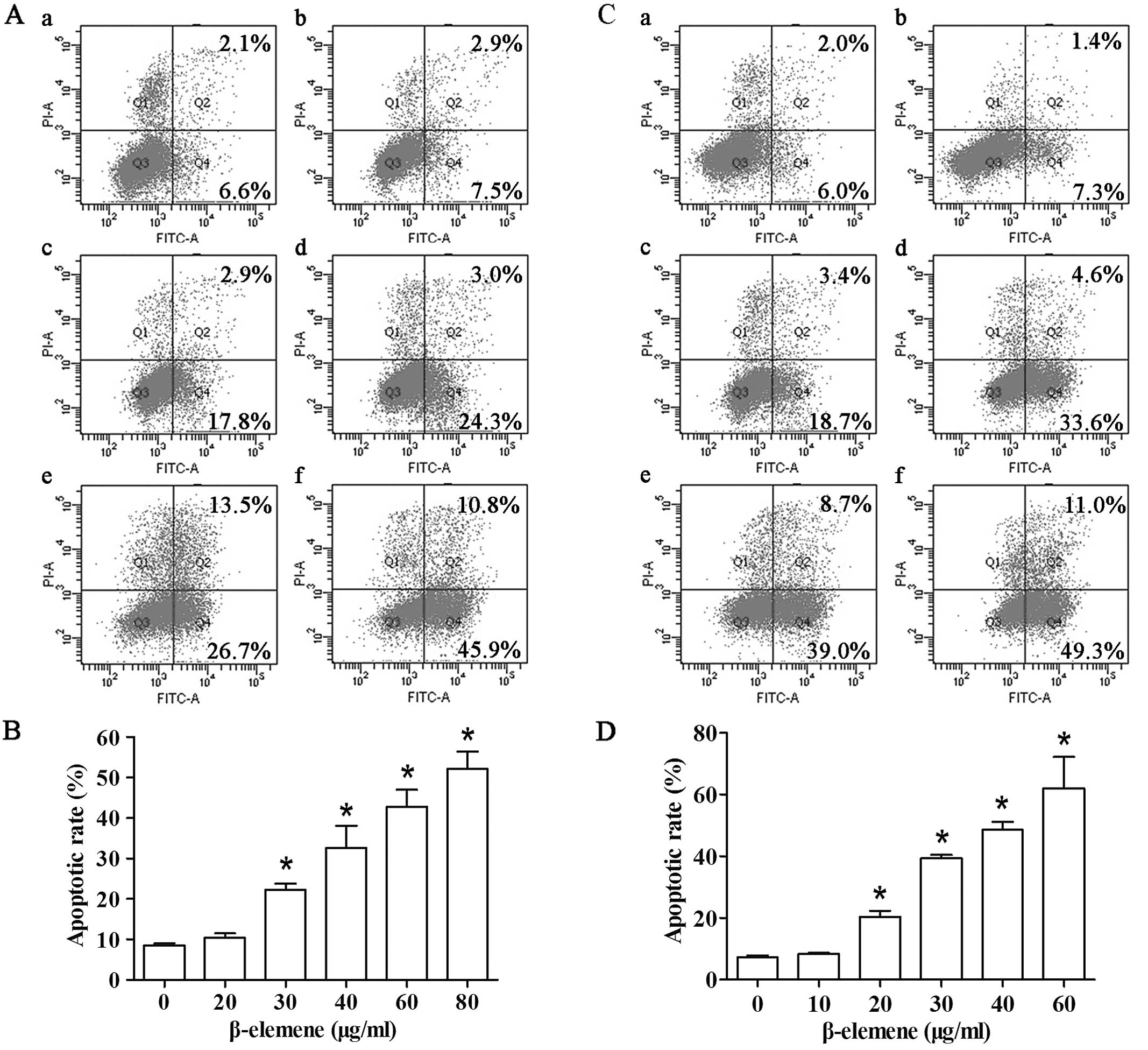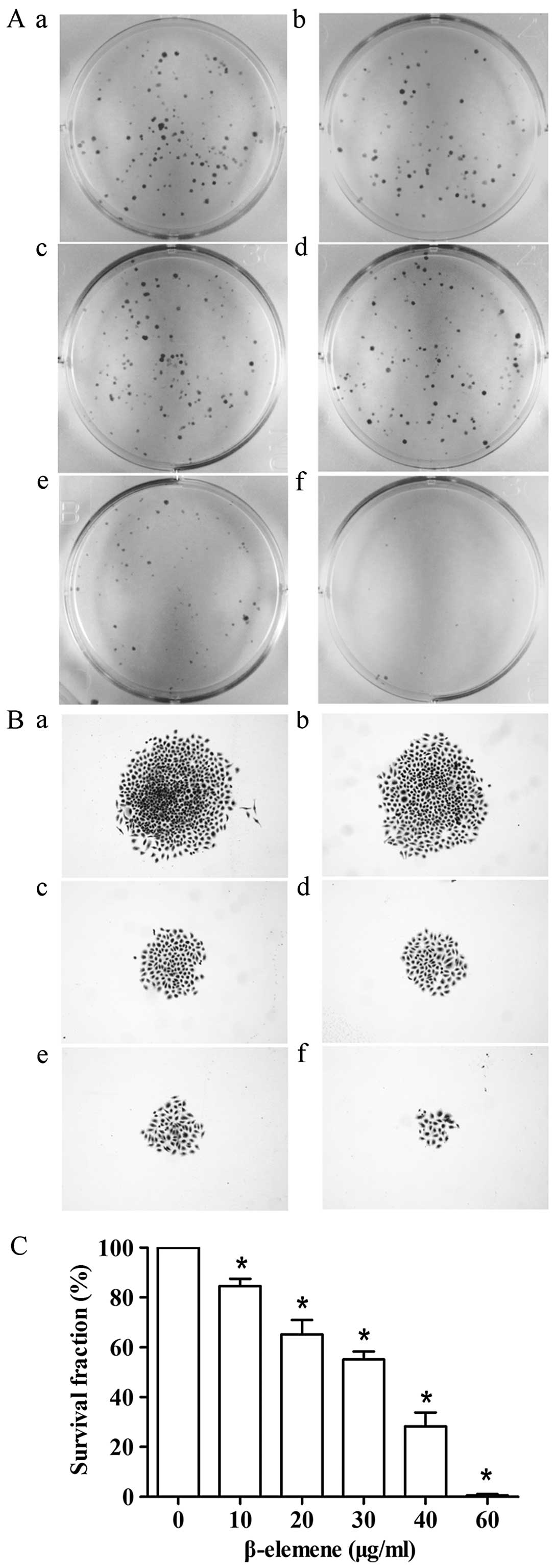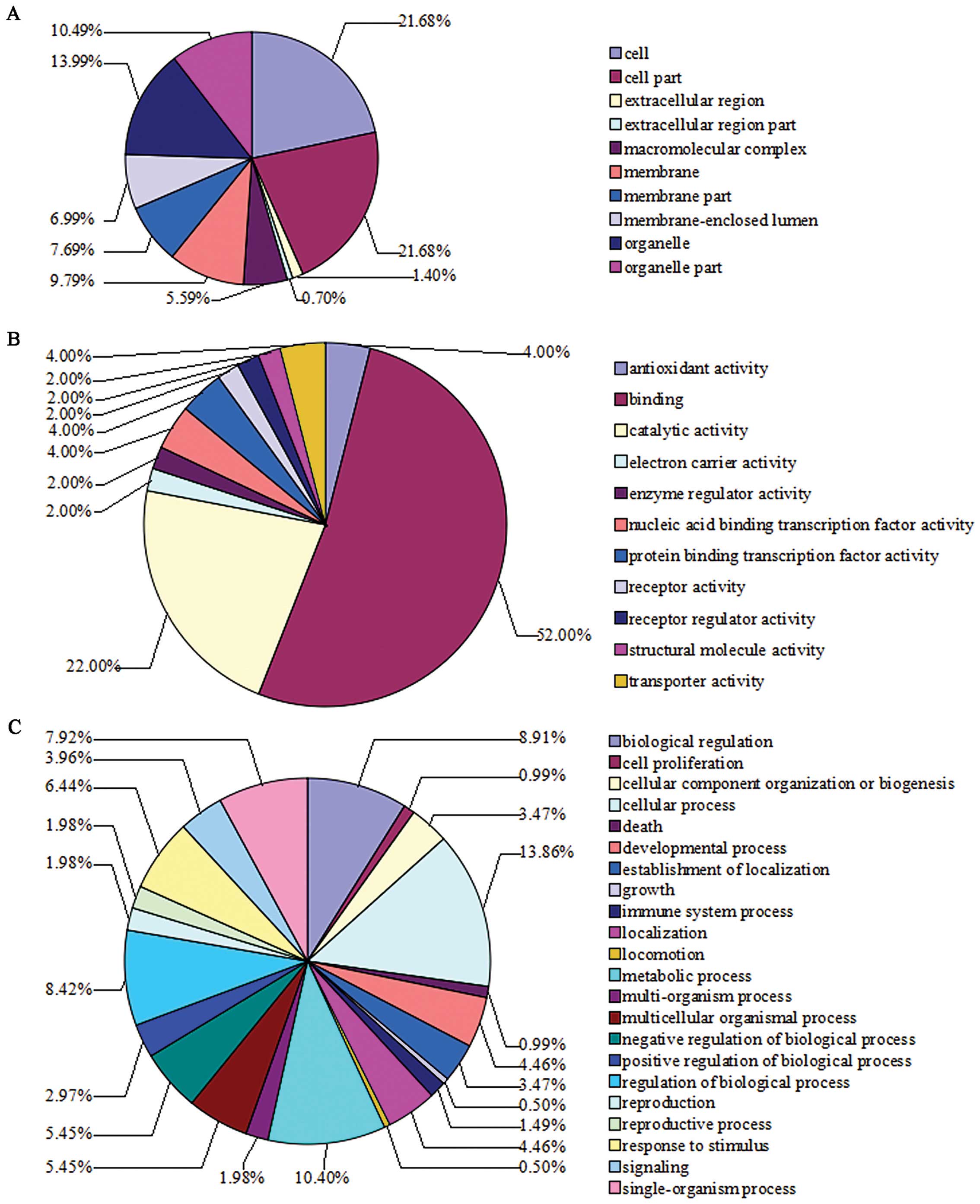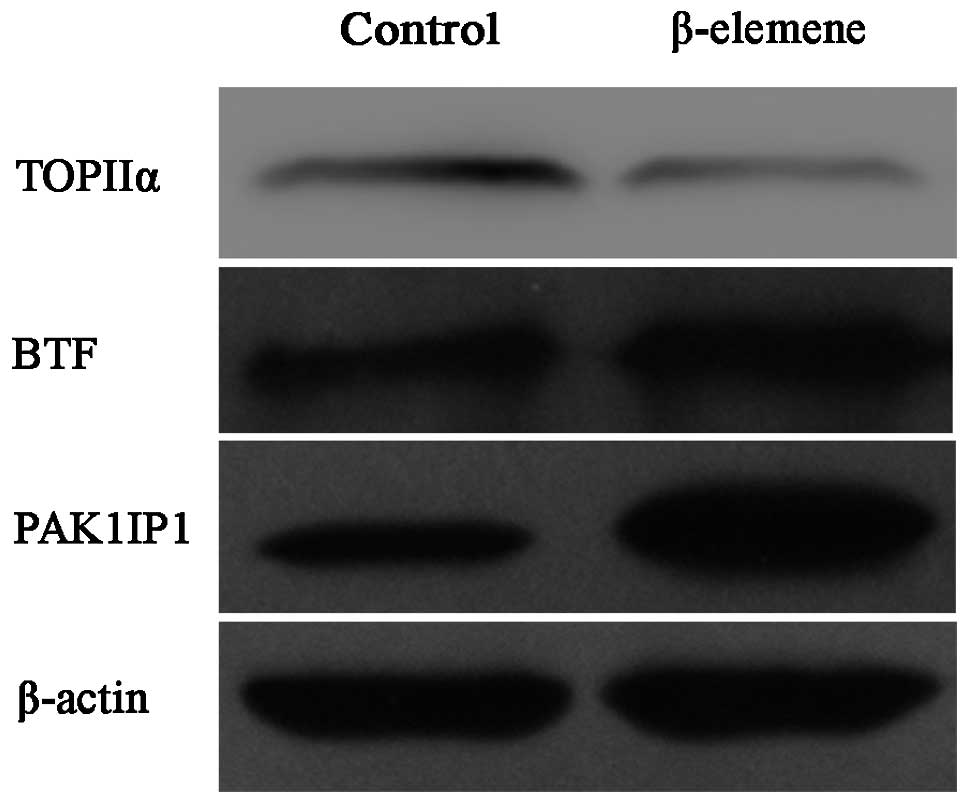|
1
|
Ferlay J, Shin HR, Bray F, Forman D,
Mathers C and Parkin DM: Estimates of worldwide burden of cancer in
2008: GLOBOCAN 2008. Int J Cancer. 127:2893–2917. 2010. View Article : Google Scholar : PubMed/NCBI
|
|
2
|
Saka M, Morita S, Fukagawa T and Katai H:
Present and future status of gastric cancer surgery. Jpn J Clin
Oncol. 41:307–313. 2011. View Article : Google Scholar : PubMed/NCBI
|
|
3
|
Sastre J, García-Saenz JA and Diaz-Rubio
E: Chemotherapy for gastric cancer. World J Gastroenterol.
12:204–213. 2006.
|
|
4
|
Smalley SR, Benedetti JK, Haller DG, et
al: Updated analysis of SWOG-directed intergroup study 0116: a
phase III trial of adjuvant radiochemotherapy versus observation
after curative gastric cancer resection. J Clin Oncol.
30:2327–2333. 2012. View Article : Google Scholar
|
|
5
|
Sakamoto J, Teramukai S, Nakazato H, et
al: Efficacy of adjuvant immunochemotherapy with OK-432 for
patients with curatively resected gastric cancer: a meta-analysis
of centrally randomized controlled clinical trials. J Immunother.
25:405–412. 2002. View Article : Google Scholar
|
|
6
|
Dassen AE, Lemmens VE, van de Poll-Franse
LV, et al: Trends in incidence, treatment and survival of gastric
adenocarcinoma between 1990 and 2007: a population-based study in
the Netherlands. Eur J Cancer. 46:1101–1110. 2010. View Article : Google Scholar : PubMed/NCBI
|
|
7
|
Zhang H, Sun LL, Meng YL, et al: Survival
trends in gastric cancer patients of Northeast China. World J
Gastroenterol. 17:3257–3262. 2011.PubMed/NCBI
|
|
8
|
Yoo CH, Noh SH, Shin DW, Choi SH and Min
JS: Recurrence following curative resection for gastric carcinoma.
Br J Surg. 87:236–242. 2000. View Article : Google Scholar : PubMed/NCBI
|
|
9
|
D’Angelica M, Gonen M, Brennan MF,
Turnbull AD, Bains M and Karpeh MS: Patterns of initial recurrence
in completely resected gastric adenocarcinoma. Ann Surg.
240:808–816. 2004.PubMed/NCBI
|
|
10
|
Di Costanzo F, Gasperoni S, Manzione L, et
al: Adjuvant chemotherapy in completely resected gastric cancer: a
randomized phase III trial conducted by GOIRC. J Natl Cancer Inst.
100:388–398. 2008.PubMed/NCBI
|
|
11
|
GASTRIC (Global Advanced/Adjuvant Stomach
Tumor Research International Collaboration) Group. Paoletti X, Oba
K, Burzykowski T, et al: Benefit of adjuvant chemotherapy for
resectable gastric cancer. JAMA. 303:1729–1737. 2010. View Article : Google Scholar : PubMed/NCBI
|
|
12
|
Gan T, Wu Z, Tian L and Wang Y: Chinese
herbal medicines for induction of remission in advanced or late
gastric cancer. Cochrane Database Syst Rev. 1:CD0050962010.
View Article : Google Scholar
|
|
13
|
Tan W, Lu J, Huang M, et al: Anti-cancer
natural products isolated from chinese medicinal herbs. Chin Med.
6:272011. View Article : Google Scholar : PubMed/NCBI
|
|
14
|
Lee RX, Li QQ and Reed E: β-elemene
effectively suppresses the growth and survival of both
platinum-sensitive and -resistant ovarian tumor cells. Anticancer
Res. 32:3103–3113. 2012.
|
|
15
|
Lu X, Wang Y, Luo H, et al: β-elemene
inhibits the proliferation of T24 bladder carcinoma cells through
upregulation of the expression of Smad4. Mol Med Rep. 7:513–518.
2013.
|
|
16
|
Zhan YH, Liu J, Qu XJ, et al: β-elemene
induces apoptosis in human renal-cell carcinoma 786-0 cells through
inhibition of MAPK/ERK and PI3K/Akt/mTOR signalling pathways. Asian
Pac J Cancer Prev. 13:2739–2744. 2012.
|
|
17
|
Xu HB, Li L, Fu J, Mao XP and Xu LZ:
Reversion of multidrug resistance in a chemoresistant human breast
cancer cell line by β-elemene. Pharmacology. 89:303–312.
2012.PubMed/NCBI
|
|
18
|
Li QQ, Lee RX, Liang H, Zhong Y and Reed
E: Enhancement of cisplatin-induced apoptosis by β-elemene in
resistant human ovarian cancer cells. Med Oncol. 30:1–13. 2013.
|
|
19
|
Wang B, Peng XX, Sun R, et al: Systematic
review of β-elemene injection as adjunctive treatment for lung
cancer. Chin J Integr Med. 18:813–823. 2012.
|
|
20
|
Xu HB, Zheng LP, Li L, Xu LZ and Fu J:
Elemene, one ingredient of a Chinese herb, against malignant
tumors: a literature-based meta-analysis. Cancer Invest.
31:156–166. 2013. View Article : Google Scholar : PubMed/NCBI
|
|
21
|
Li QQ, Wang G, Huang F, Banda M and Reed
E: Antineoplastic effect of β-elemene on prostate cancer cells and
other types of solid tumour cells. J Pharm Pharmacol. 62:1018–1027.
2010.
|
|
22
|
Wang G, Li X, Huang F, et al: Antitumor
effect of β-elemene in non-small-cell lung cancer cells is mediated
via induction of cell cycle arrest and apoptotic cell death. Cell
Mol Life Sci. 62:881–893. 2005.
|
|
23
|
García-Sáez AJ: The secrets of the Bcl-2
family. Cell Death Differ. 19:1733–1740. 2012.
|
|
24
|
Kasof GM, Goyal L and White E: Btf, a
novel death-promoting transcriptional repressor that interacts with
Bcl-2-related proteins. Mol Cell Biol. 19:4390–4404.
1999.PubMed/NCBI
|
|
25
|
Liu H, Lu ZG, Miki Y and Yoshida K:
Protein kinase C δ induces transcription of the TP53 tumor
suppressor gene by controlling death-promoting factor Btf in the
apoptotic response to DNA damage. Mol Cell Biol. 27:8480–8491.
2007.
|
|
26
|
Sarras H, Alizadeh Azami S and McPherson
JP: In search of a function for BCLAF1. Sci World J. 10:1450–1461.
2010. View Article : Google Scholar : PubMed/NCBI
|
|
27
|
Lee YY, Yu YB, Gunawardena HP, Xie L and
Chen X: BCLAF1 is a radiation-induced H2AX-interacting partner
involved in γH2AX-mediated regulation of apoptosis and DNA
repair. Cell Death Dis. 3:e3592012. View Article : Google Scholar : PubMed/NCBI
|
|
28
|
Kataoka T, Holler N, Micheau O, et al:
Bcl-rambo, a novel Bcl-2 homologue that induces apoptosis via its
unique C-terminal extension. J Biol Chem. 276:19548–19554. 2001.
View Article : Google Scholar : PubMed/NCBI
|
|
29
|
Kim JY, So KJ, Lee S and Park JH:
Bcl-rambo induces apoptosis via interaction with the adenine
nucleotide translocator. FEBS Lett. 586:3142–3149. 2012. View Article : Google Scholar : PubMed/NCBI
|
|
30
|
Xia C, Ma W, Stafford LJ, Marcus S, Xiong
WC and Liu M: Regulation of the p21-activated kinase (PAK) by a
human Gβ-like WD-repeat protein, hPIP1. Proc Natl Acad Sci USA.
98:6174–6179. 2001.PubMed/NCBI
|
|
31
|
Dummler B, Ohshiro K, Kumar R and Field J:
Pak protein kinases and their role in cancer. Cancer Metastasis
Rev. 28:51–63. 2009. View Article : Google Scholar
|
|
32
|
Kissil JL, Wilker EW, Johnson KC, Eckman
MS, Yaffe MB and Jacks T: Merlin, the product of the Nf2 tumor
suppressor gene, is an inhibitor of the p21-activated kinase, Pak1.
Mol Cell. 12:841–849. 2003. View Article : Google Scholar : PubMed/NCBI
|
|
33
|
Hirokawa Y, Nakajima H, Hanemann CO, et
al: Signal therapy of NF1-deficient tumor xenograft in mice by the
anti-PAK1 drug FK228. Cancer Biol Ther. 4:379–381. 2005. View Article : Google Scholar : PubMed/NCBI
|
|
34
|
Yu W, Qiu Z, Gao N, et al: PAK1IP1, a
ribosomal stress-induced nucleolar protein, regulates cell
proliferation via the p53-MDM2 loop. Nucleic Acids Res.
39:2234–2248. 2011. View Article : Google Scholar : PubMed/NCBI
|
|
35
|
Dai MS and Lu H: Inhibition of
MDM2-mediated p53 ubiquitination and degradation by ribosomal
protein L5. J Biol Chem. 279:44475–44482. 2004. View Article : Google Scholar : PubMed/NCBI
|
|
36
|
Chen D, Zhang Z, Li M, et al: Ribosomal
protein S7 as a novel modulator of p53-MDM2 interaction: binding to
MDM2, stabilization of p53 protein, and activation of p53 function.
Oncogene. 26:5029–5037. 2007. View Article : Google Scholar : PubMed/NCBI
|
|
37
|
Dai MS, Sun XX and Lu H: Ribosomal protein
L11 associates with c-Myc at 5 S rRNA and tRNA genes and regulates
their expression. J Biol Chem. 285:12587–12594. 2010. View Article : Google Scholar : PubMed/NCBI
|
|
38
|
Zhou X, Hao Q, Liao JM, Liao P and Lu H:
Ribosomal protein S14 negatively regulates c-Myc activity. J Biol
Chem. 288:21793–21801. 2013. View Article : Google Scholar : PubMed/NCBI
|
|
39
|
Shi Y, Zhai H, Wang X, et al: Ribosomal
proteins S13 and L23 promote multidrug resistance in gastric cancer
cells by suppressing drug-induced apoptosis. Exp Cell Res.
296:337–346. 2004. View Article : Google Scholar : PubMed/NCBI
|
|
40
|
Lopez CD, Martinovsky G and Naumovski L:
Inhibition of cell death by ribosomal protein L35a. Cancer Lett.
180:195–202. 2002. View Article : Google Scholar : PubMed/NCBI
|
|
41
|
Marenholz I, Lovering RC and Heizmann CW:
An update of the S100 nomenclature. Biochim Biophys Acta.
1763:1282–1283. 2006. View Article : Google Scholar : PubMed/NCBI
|
|
42
|
Gross SR, Sin CG, Barraclough R and
Rudland PS: Joining S100 proteins and migration: for better or for
worse, in sickness and in health. Cell Mol Life Sci. 71:1551–1579.
2014. View Article : Google Scholar : PubMed/NCBI
|
|
43
|
Madureira PA, O’Connell PA, Surette AP,
Miller VA and Waisman DM: The biochemistry and regulation of
S100A10: a multifunctional plasminogen receptor involved in
oncogenesis. J Biomed Biotechnol. 2012:3536872012. View Article : Google Scholar : PubMed/NCBI
|
|
44
|
El-Rifai W, Moskaluk CA, Abdrabbo MK, et
al: Gastric cancers overexpress S100A calcium-binding proteins.
Cancer Res. 62:6823–6826. 2002.PubMed/NCBI
|
|
45
|
Domoto T, Miyama Y, Suzuki H, et al:
Evaluation of S100A10, annexin II and B-FABP expression as markers
for renal cell carcinoma. Cancer Sci. 98:77–82. 2007. View Article : Google Scholar : PubMed/NCBI
|
|
46
|
Yang X, Popescu NC and Zimonjic DB: DLC1
interaction with S100A10 mediates inhibition of in vitro cell
invasion and tumorigenicity of lung cancer cells through a
RhoGAP-independent mechanism. Cancer Res. 71:2916–2925. 2011.
View Article : Google Scholar : PubMed/NCBI
|
|
47
|
Shang J, Zhang Z, Song W, et al: S100A10
as a novel biomarker in colorectal cancer. Tumour Biol.
34:3785–3790. 2013. View Article : Google Scholar : PubMed/NCBI
|
|
48
|
Oue N, Hamai Y, Mitani Y, et al: Gene
expression profile of gastric carcinoma: identification of genes
and tags potentially involved in invasion, metastasis, and
carcinogenesis by serial analysis of gene expression. Cancer Res.
64:2397–2405. 2004. View Article : Google Scholar
|



















